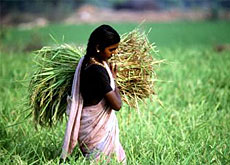Ticino farmer goes for the exotic

Farmers in the Italian-speaking part of Switzerland have been branching away from their typical crops of maize and tomatoes into something more exotic – rice.
To mark the United Nations “International Year of Rice”, swissinfo visited a farmer in Ascona to find out about rice growing, Swiss style.
Ticino’s Mediterranean climate – it lies south of the Alps and is the country’s sunniest canton – has proved to be ideal for the cultivation of rice.
The grain has also been a salvation for the canton’s struggling farmers, including Renato Altrocchi, owner of the Terreni alla Maggia farm in Ascona.
“Prices for conventional crops — maize and wheat — have plunged,” Altrocchi told swissinfo.
“Since we’re a joint-stock company and don’t get government subsidies, we had to find alternatives to survive,” he added.
Success
Altrocchi therefore decided to abandon traditional crops in 1997 and has been growing rice ever since.
“It was a success – we started with two hectares and now we have 52,” Altrocchi said.
Other parts of Switzerland have also tried to grow rice but only Ticino has been successful.
This is because Ticino- which has the most northerly rice fields in Europe – seems to be at the climate limit for growing the crop.
But Altrocchi says that the weather is not the only reason why the rice is doing so well in Ascona.
“Growing rice is like learning a language – you need knowledge and experience,” he said.
Although new to Switzerland, rice growing in southern Europe is already well-established.
The plant has been cultivated in neighbouring Italy, in the country’s “golden triangle” of rice between Vercelli, Novara and Pavia, for centuries.
But Altrocchi says that, for him, rice is not a temporary solution.
“I also chose this crop because of my own personal interest – it’s always exciting to try something new,” he said.
No paddies
The short growing season means that only one kind of rice called Loto, a risotto rice, is grown in Ticino. Loto grows early in the season making it particularly suited to the climate in Ascona.
But anyone who comes to Ticino hoping to find an submerged rice paddies, such as are normally found in Asia, will be disappointed.
“This kind of land is not well suited to flooding, said Altrocchi. “We opted for a sprinkler irrigation system, using the equipment we already had for conventional crops.”
The system saves huge quantities of water but it’s still quite a labour intensive process, as the fields have to be irrigated a least once a week.
More than 240 tonnes of rice are produced this way each year. This reduces to 120 tonnes once the grain has been through the various phases of refinement, such as hulling, milling and polishing.
Most of the crop is then sold on the domestic market.
Controversy
Rice growing is not without controversy. Over the past years, there has been an explosion in the number of varieties – there are now around 50 types of rice, of which almost 20 per cent end up on the market.
Bioengineering has also played an important role in the development of new plants, such as “golden rice” which has been genetically modified to increase its vitamin A content.
Altrocchi, however, is keen to stress that genetically modified organisms (GMOs) have no place on his farm.
“Swiss consumers, like those in the rest of Europe, don’t want anything to do with GMOs,” he told swissinfo.
“So we abstain from them completely in all the crops we farm.”
swissinfo, Luigi Jorio in Ascona
In 1997, there were 2 hectares of rice fields in Ascona.
This rose to 52 hectares in 2003.
70% of the harvest is sold in Ticino.
Rice is traditionally grown on land that is flooded to ensure a constant temperature and level of moisture.
Rice is planted in the spring and harvested in October.
In tropical regions, there can be as many as three harvests per year.
Rice growing has also been attempted in the cantons of Basel, Aargau, Thurgau, Geneva, Valais and Lucerne.

In compliance with the JTI standards
More: SWI swissinfo.ch certified by the Journalism Trust Initiative











You can find an overview of ongoing debates with our journalists here . Please join us!
If you want to start a conversation about a topic raised in this article or want to report factual errors, email us at english@swissinfo.ch.